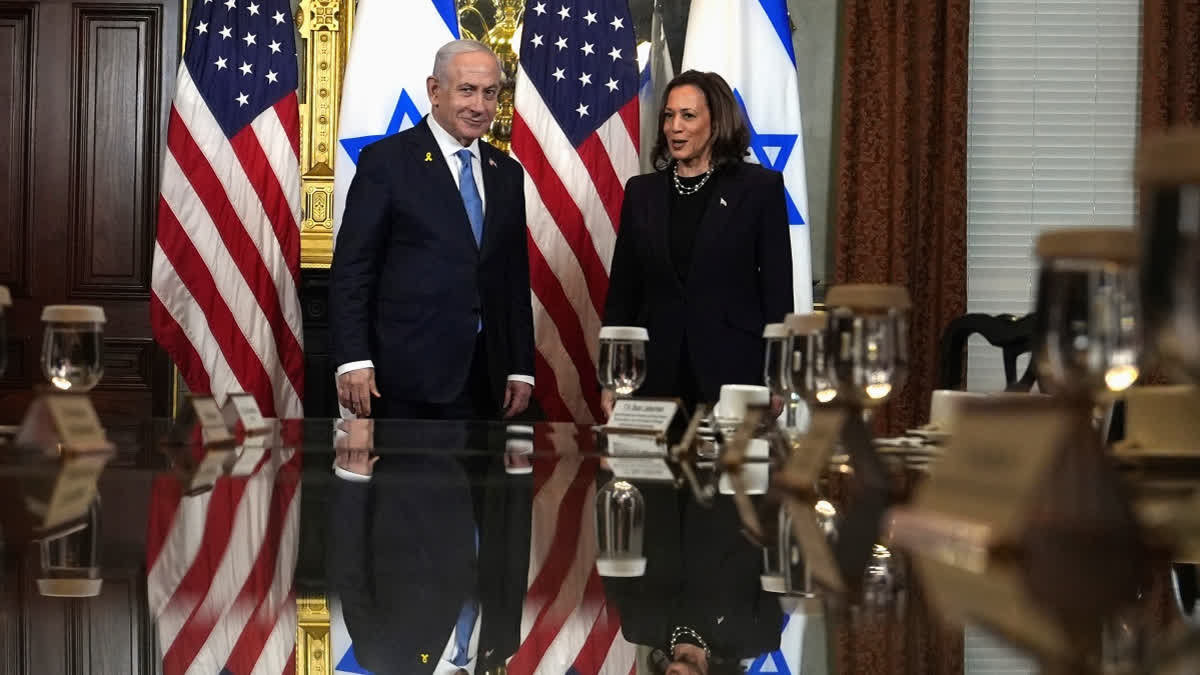Washington: Vice President Kamala Harris on Thursday said she urged Israeli Prime Minister Benjamin Netanyahu to reach a cease-fire deal soon with Hamas so that dozens of hostages held by the militants in Gaza since Oct. 7 can return home.
Harris said she had a "frank and constructive" conversation with Netanyahu in which she affirmed Israel's right to defend itself but also expressed deep concern about the high death toll in Gaza over nine months of war and the "dire" humanitarian situation there.
With all eyes on the likely Democratic presidential nominee, Harris largely reiterated President Joe Biden's longstanding message that it's time to find an endgame to the brutal war in Gaza, where more than 39,000 Palestinians have died. Yet she offered a more forceful tone about the urgency of the moment just one day after Netanyahu gave a fiery speech to Congress in which he defended the war, vowed "total victory" against Hamas and made relatively scant mention of cease-fire negotiations.
"There has been hopeful movement in the talks to secure an agreement on this deal," Harris told reporters shortly after meeting with Netanyahu. "And as I just told Prime Minister Netanyahu, it is time to get this deal done."
Netanyahu met separately earlier in the day with Biden, who has also been calling on Israel and Hamas to come to an agreement on a U.S.-backed, three-phase deal to bring home remaining hostages and establish an extended cease-fire.
Harris said after her meeting with Netanyahu that Israel's war in Gaza is more complicated than simply being supportive of one side or the other. "Too often, the conversation is binary when the reality is anything but," Harris said.
Harris also condemned Hamas' brutality. White House national security spokesperson John Kirby reiterated the administration's position that the militant group that killed some 1,200 on Oct. 7 and kidnapped 250 people from Israel ultimately holds responsibility for the suffering in Gaza and must come to terms with Israel.
Kirby added that gaps between the two sides can be closed "but there are issues that need to be resolved that will require some leadership, some compromise."
With Harris' forceful comments, the administration also appeared to be stepping up pressure on the Israelis to not let the moment pass to get a deal done.
"What has happened in Gaza over the past nine months is devastating. The images of dead children and desperate, hungry people fleeing for safety, sometimes displaced for the second, third or fourth time," Harris said. "We cannot look away in the face of these tragedies. We cannot allow ourselves to become numb to the suffering. And I will not be silent."
Thousands protested Netanyahu's visit to Washington, and Harris condemned those who were violent or used rhetoric that praised Hamas.
Netanyahu, last at the White House when former President Donald Trump was in office, is headed to Florida on Friday to meet with the Republican presidential nominee.
Ahead of the Harris-Netanyahu meeting Thursday, Trump said at a rally in North Carolina the vice president was "totally against the Jewish people."
Harris has long spoken of her strong support for Israel. The first overseas trip of her Senate career in early 2017 was to Israel, and one of her first acts in office was to introduce a resolution opposing a U.N. Security Council resolution condemning Israel.
She's also spoken of her personal ties to Israel, including memories of raising money as a child to plant trees in Israel and installing a mezuzah near the front door of the vice president's residence in Washington — her husband is Jewish. She also has connections to pro-Israel groups including the conservative American Israel Public Affairs Committee and the liberal J Street.
